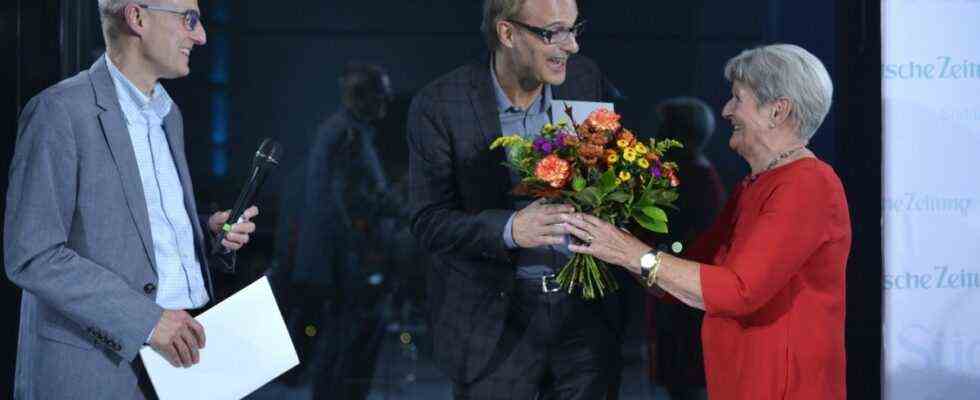Andreas Wenderoth is a rather calm person who doesn’t like to be in the front row, but this evening the stage belongs to him. Because the Berlin journalist wrote an award-winning text – the portrait of a highly educated, clever, funny and imaginative person. “Dr. Gross, the superman. If nothing helps, only the lithium tablet will help,” was the story in Im Reports-Magazine. It is about a 76-year-old philosopher and his illness, a schizoaffective psychosis, which among other things leads to the fact that he sometimes sees himself as the reincarnation of Beethoven or Stalin, with all side effects that are stressful for his environment.
How this Peter Gross lives with his multiple personalities, how he copes with his everyday life with the help of a caring nurse and fluctuates between “complete bliss” and states of madness: Andreas Wenderoth tells all of this in an exemplary manner. By giving his protagonist the dignity – and his readers the space to form their own judgment. So the very best reporter virtues.
Now the author is on the 26th floor of the SZ high-rise in Munich. It is a great honor to receive the Herbert Riehl Heyse Prize, says Wenderoth, who describes himself as an introverted hypochondriac. But despite the pandemic, he was happy to travel from Berlin to Munich for this special award. “This is my first attempt in a long time to move around people,” says the winner. Wenderoth also says about himself that he needs writing in order to feel alive – but Dr. Gross, the protagonist of his story, to whom the author expressly thanks. For such a lengthy research you need trust above all. And enough time to approach such a complex person.
Wenderoth also uses his short acceptance speech to appeal: namely to journalists to pause before judging, to think longer and to question themselves. As a younger reporter, he sometimes wrote more amusing himself, always on the hunt for punch lines and accentuations, “I am sure I was often arrogant.” A sympathetic appearance by the award winner, who Herbert Riehl-Heyse calls his journalistic role model.
The editor-in-chief tells how Riehl-Heyse once ruthlessly but friendly tore him to pieces as a prospective reporter
This evening in the SZ editorial office is also a good opportunity to remember Herbert Riehl-Heyse as a person. And of the special spirit that shaped this newspaper: the cheerful serenity and the art of precise observation, the fairness and the humor, the certain playfulness – all of this often flashes in the texts of the journalist who died in 2003. SZ editor-in-chief Wolfgang Krach tells how, as a young trainee, he was once ruthlessly dismantled in a reportage seminar by Riehl-Heyse: The story about a street painter is “not so bad for a beginner,” was the verdict. only the prospective reporter has to make more effort at the introduction, be more original at the end and completely recompose the middle section. Riehl-Heyse had the ability to “make clear judgments without discrediting people,” says Krach.
Herbert Riehl-Heyse shaped the tone and style of the SZ until he passed away in 2003.
(Photo: Regina Schmeken / Sueddeutsche Zeitung Photo)
The keynote speaker Tamara Dietl, bestselling author and crisis advisor for companies, will talk about how to maintain a sense of humor and calm in difficult times. Her topic is the tremendous speed, the radical digitization of all areas of life and total networking. Dietl can clearly explain how, as a young television journalist, she first had to buy a new handbag due to the technical innovation: The old one was far too small for the huge new mobile phone.
Tempi passati. The much-touted fax machines and answering machines have long been industrial scrap; instead there is the iPhone, the almighty mini-computer that represents the “infrastructure of our existence”. However, many people experienced the change as “psychosocial stress”, which could lead to tunnel vision, a denial of reality and depression. Fortunately, the lecture is less a finding of illness than an encouragement: to more self-efficacy, resilience and better social relationships. “Humor can also help a lot,” says Tamara Dietl. With which she has again cast the bow to the namesake of the evening.
“Humor can also help a lot,” says keynote speaker Tamara Dietl.
(Photo: Robert Haas / Robert Haas)
The guests then exchange many anecdotes over snacks and wine. The former Federal Finance Minister and CSU boss Theo Waigel and the cabaret artist Bruno Jonas, who both had a friendly relationship with Riehl-Heyse, quickly talked about the present – the consequences of the federal election, the political fate of Armin Laschet, that Legacy of Angela Merkel and the youth, who prefer to vote green and yellow, can be argued about. Better than watching another talk show, it’s just to talk to each other yourself.

